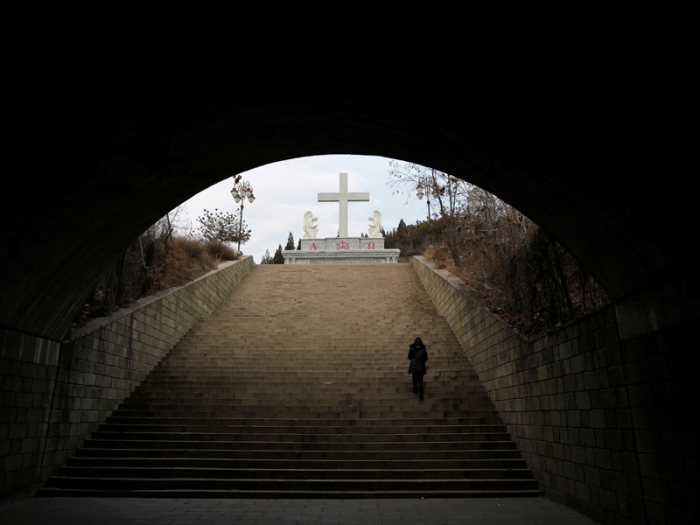Chinese Christian children face bullying, discrimination from Communist gov't, schools

A Chinese Christian has opened up about the severe persecution he and other Christian children have endured for their faith, from bullying and discrimination at school to restrictions on freedom of thought and religious expression.
“Growing up as a Christian in China was a difficult experience,” a Chinese Christian identified only as "Enoch" said during the United Nations Human Rights Council Side Event: China Bans Faith for All Children webinar, hosted by the Jubilee Campaign on Monday.
Because his father was a pastor, Enoch’s entire family was monitored by Chinese Communist Party officials, neighbors, and surveillance cameras 24 hours a day. The family was prohibited from worshiping together in church, while Enoch and his siblings were ordered to refrain from sharing their faith at school.
“We were to only believe in the CCP,” he recalled. “If our religious affiliation was discovered, we would receive punishment from the school.”
Eventually, Enoch’s father was arrested and detained for his faith and Christian leadership. While his father was imprisoned, Enoch faced intimidation and threats by his peers, teachers and government officials.
“I faced unkindness and discrimination at school from teachers,” he said. “Government officials threatened my dad that if he did not cooperate with them, they would hire again members to come to my school to beat me up. They also told him that I would not be able to go to college, as I would never pass the political screening because I come from a Christian family.”
On Enoch’s birthday, his father was granted a phone call. “We felt it was God's blessing to our family,” he said. “I talked to my father over the phone and I didn't really know what to say. So I asked him just to sing me the Happy Birthday song. And at the end, we both burst into tears.”
At that moment, Enoch was “overwhelmed with sadness,” realizing how different his life was because of his Christian faith.
“For a regular kid, hearing his father tell him happy birthday is a normal thing, but for me, it was the most special gift that I could ever ask for,” he said. “As happy as I was to hear from him, I was also saddened and angry that the government has separated me from my father when I was a kid just because we are a Christian family.
“My childhood experiences were tainted by the absence of my father throughout the years.”
Lawyers refused to take his father’s case, and Enoch said his family felt “stuck, as Christians in a country where ... we can never truly be free to practice peacefully and without restrictions.”
“We were constantly afraid of being harassed by neighbors, peers and government officials, or being thrown in prison."
Today, Enoch no longer lives in China. “I am very proud of being a Christian now,” he said.
“There are many families in China that suffered a similar situation to mine and who are deprived of these basic right to religious freedom,” he said. “It is important that we don't forget to share these stories ... of persecuted people.”
Enoch was among several individuals who shared their or their loved ones’ personal testimonies of religious persecution in China. Members of China’s Uighur Muslim, Tibetan Buddhist, and Falun Gong religious minorities, all victims and survivors of the CCP’s persecution of children of faith, also spoke out.
The event on Monday focused on how China, through its current actions, breaches the Convention on the Rights of the Child, specifically Articles 14 and 29.
Article 14 of the Convention on the Rights of the Child states, “State parties shall respect the right of the child to freedom of thought, conscience, and religion.” China's constitution in Article 36 also protects the right of children to seek religious belief, and it guarantees nondiscrimination on the basis of religion.
Emilie Kao, an attorney who has defended religious freedom for the last 14 years, said that despite these laws, the Chinese government’s overlapping network of national, provincial, and local regulations “censor religion from every part of a child's life from the public square to literature, media, and social media, to school and even in the home.”
She explained that the 2018 Regulations on Religious Affairs, enacted by President Xi Jinping, have been interpreted to ban attendance at churches and other houses of worship and to prohibit children under the age of 18 from attending religious activities.
According to Kao, the censorship of religion and the lives of children serves the Communist Party's goal of ideological control, as they “equate pro-atheism with being pro-communist with being pro-China.”
China seeks to restrict freedom of thought, conscience and religion, she said, by forcing teachers to sign pledges not to attend religious services, requiring both parents and children not to attend religious services or participate in religious activities, and even encouraging children to report on their parents if they teach religion.
“China's policies against children, teachers and parents violate the universal human rights of all Chinese citizens,” she argued. “Children in China should be free from government interference and their pursuit of understanding themselves, the world and their Creator.”
“The government should not have a monopoly on answering children's questions when they ask about moral or metaphysical questions. Parents should be able to build their own families, according to their own beliefs.”
The Jubilee Campaign said the event was designed to “serve as a base to understand the widespread effects of China’s breaches to the Convention the Rights of the Child article 14 and facilitate steps forward for member states and U.N. bodies to address the violations.”





























